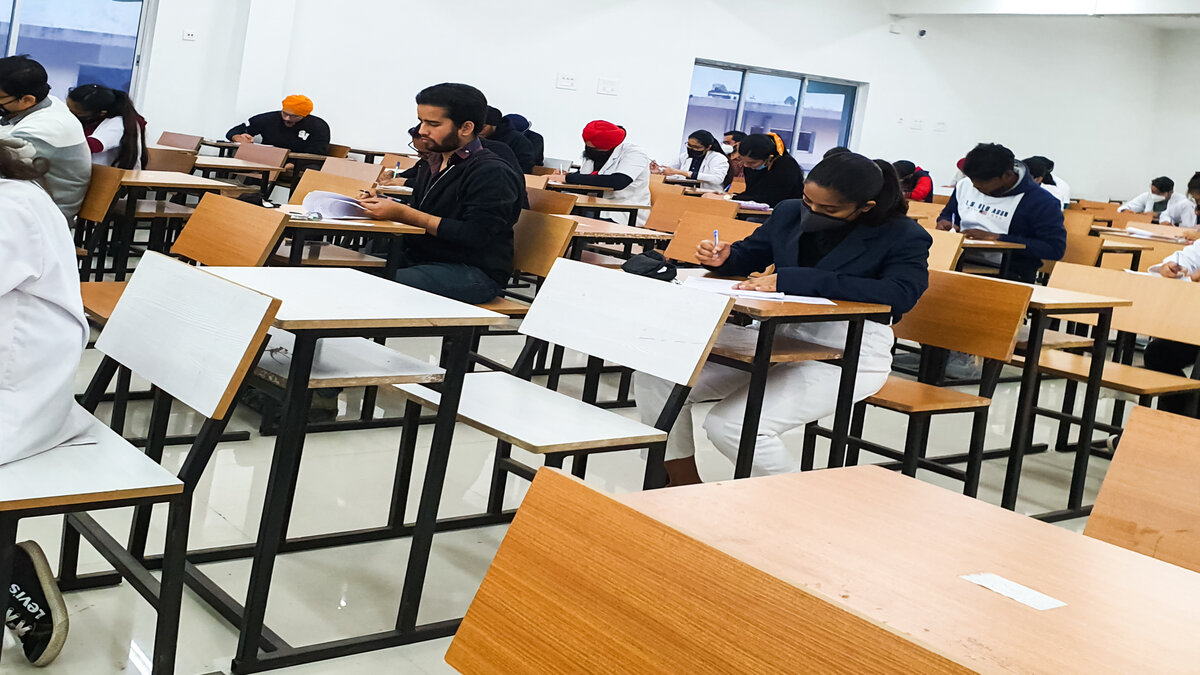Jaipur | March 7, 2025: A controversy has erupted in Rajasthan after a video showing two Brahmin candidates being asked to remove their sacred thread (‘janeu’) at a Rajasthan Eligibility Examination for Teachers (REET) centre in Dungarpur district went viral on social media. The incident, which took place on February 27 and 28, has sparked widespread outrage among community organizations and political leaders, leading to disciplinary action against two officials.
Incident at Dungarpur Exam Centre
According to reports, two candidates from the Brahmin community were only allowed entry into the examination centre after they removed their ‘janeu’ – a sacred thread worn by Brahmin men as a religious practice. The video of the incident, which surfaced online, quickly gained traction, with many questioning the move and calling it an infringement on religious freedom.
Following media reports and an administrative inquiry, Dungarpur Collector Ankit Kumar confirmed that the teacher who supervised the exam at the centre has been suspended, while a police constable has been directed to report to headquarters.
Political and Community Backlash
The issue has triggered a political storm in Rajasthan, with leaders from various parties condemning the incident. The opposition BJP has accused the state government of promoting an anti-Hindu stance and demanded strict action against those responsible. Rajasthan BJP leader Rajendra Rathore criticized the authorities, stating, “Religious sentiments must be respected, and such incidents should not be tolerated in a democracy.”
Meanwhile, Congress leaders have attempted to downplay the controversy, urging for a fair investigation before making political allegations. A senior Congress minister stated, “The state government does not endorse such actions. The officials responsible have been identified and appropriate measures are being taken.”
Several Brahmin organizations have also voiced their discontent, demanding an apology from the government and assurances that such incidents will not happen again in the future. The Rajasthan Brahmin Mahasabha has planned a protest, calling for accountability from the education department.
Government’s Response and Corrective Measures
Following the uproar, the Rajasthan government has assured a fair probe into the matter. The administration has clarified that the officials involved have faced immediate action and that all examination centres will be instructed to ensure religious sensitivities are respected in the future.
Dungarpur Collector Ankit Kumar stated, “We take religious sentiments seriously. The administration is reviewing protocols to prevent such incidents. Candidates’ dignity and religious beliefs should always be upheld.”
Exam Security vs. Religious Sensitivities
While exam centres maintain strict frisking and security protocols to prevent malpractices, this incident raises concerns about the balance between security measures and religious freedoms. Many argue that the authorities should have handled the situation with greater sensitivity rather than compelling candidates to remove a religious symbol.
Legal experts suggest that compelling an individual to remove religious attire or accessories without a valid security concern could be seen as a violation of fundamental rights under Article 25 of the Indian Constitution, which guarantees religious freedom.
Social Media Reactions and Public Opinion
The video’s viral spread has ignited a debate on social media, with netizens expressing mixed reactions. While some defend the need for strict exam security, many believe that religious sentiments must not be disregarded. The hashtag #RespectJaneu has been trending, with thousands demanding accountability.
A Twitter user wrote, “If hijabs are allowed in exams, why should janeu be removed? Discrimination in the name of security is unacceptable.” Another commented, “Religious practices should be respected. Authorities need to be more sensitive.”
Conclusion: A Lesson in Sensitivity?
The REET exam centre controversy in Rajasthan underscores the ongoing debate on religious rights and institutional regulations. While security measures are essential, they must be implemented without violating individual beliefs. The state government now faces pressure to ensure that such incidents do not recur and that religious sentiments are respected in public institutions.
With political parties and community leaders weighing in, the issue is far from over. The coming days will reveal whether the Rajasthan government takes additional steps to address the concerns raised by the Brahmin community and other religious groups.


